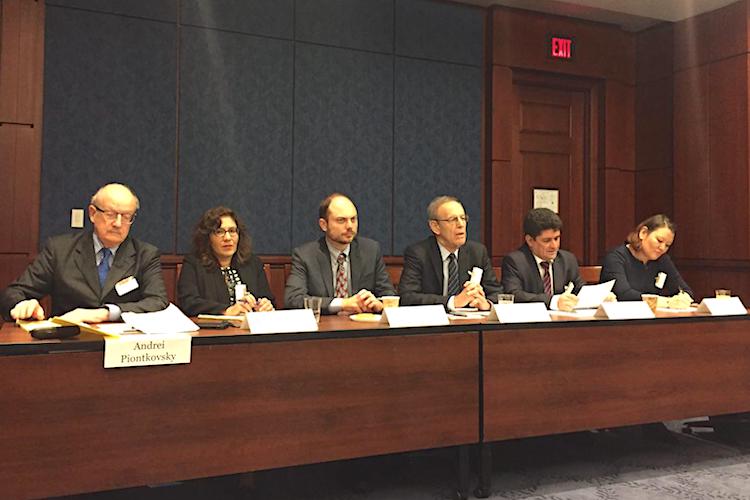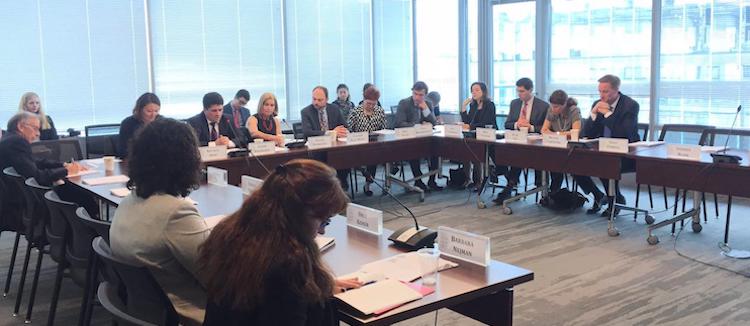On September 13, the Institute of Modern Russia participated in two expert panels in Washington, D.C. The first event, dedicated to the prospects of the democratic movement in Russia, took place in the U.S. Capitol Hill Visiting Center with the support of the National Endowment for Democracy (NED) and Free Russia Foundation. The second event was hosted by the Atlantic Council where experts discussed issues of Russia’s justice system in the light of the recent verdict in the Nemtsov case.

Left to right: Andrei Piontkovsky, Miriam Lanskoy, Vladimir Kara-Murza, Carl Gershman, Vadim Prokhorov, Natalia Arno. Photo: IMR.
Among those participating in the first expert panel were Vladimir Kara-Murza, Vice Chairman of Open Russia; Vadim Prokhorov, personal lawyer of Boris Nemtsov’s family; Andrei Piontkovsky, Visiting Fellow at the Hudson Institute; Natalia Arno, President of the Free Russia Foundation; and Miriam Lanskoy, NED’s Senior Director for Russia and Eurasia. NED President Carl Gersham moderated the discussion.
In his remarks, Vadim Prokhorov emphasized that the assassination of Boris Nemtsov is the logical outcome of the current social and political situation in Russia, where violent attacks on—and the physical removal of—opposition leaders have become common practice. This crime also shows that the regime has entered the stage of decay.
According to Vladimir Kara-Murza, the September 10 elections in Russia showed that there are many people in the country who want change. Although since 2003 no election in Russia has been free and fair, even in this harsh political climate opposition members can be successful and win against state-endorsed candidates endorsed. For example, in the recent municipal elections in Moscow 67 out of 300 graduates of Open Russia's electoral school won seats in the local assemblies, which is a triumph for a movement that will turn only three years old next week.
Miriam Lanskoy underscored the great potential of the Internet for Russia’s civil society. She estimated Russian Internet penetration at 70 percent, with over 60 percent of young people (age 18-24) getting their news online. That is one of the reasons why Alexei Navalny’s online campaigns were so popular with the Russian youth and why many young people responded to his calls to attend protests against corruption. The Kremlin understands this dynamic. The Internet has been relatively free in the country, but now the Kremlin is trying to bring it under control by introducing restrictive laws.
In Andrei Piontkovsky’s view, two factors are needed for real change in Russia—mass protests and a split among the elites. The recent anti-Russia sanctions passed by the U.S. Congress last month send a clear signal to the Russian elites that Putin is toxic for them. Piontkovsky also argued that regime change is not about Putin’s removal from power, but without this condition real reforms would be impossible
Concluding on an optimistic note, Natalia Arno said that it is now time for the Russian opposition to focus its efforts not only on discussing the country’s past or current problems, but also on building a vision for the future and on developing reform programs. “We don’t just need a Russia without Putin, but a Russia without Putinism,” she noted.

The second discussion titled “The Nemtsov Assassination: Has Justice Been Served?” took place at the Atlantic Council’s headquarters with the support of IMR and Free Russia Foundation. The political circumstances of the Nemtsov case brought together Russian and Western experts, policymakers, and human rights activists, including Vladimir Kara-Murza, Vadim Prokhorov, Natalia Arno, and Emanuelis Zingeris, a member of the Lithuanian delegation at the Parliamentary Assembly of the Council of Europe (PACE), who has been appointed a Special Rapporteur on the murder of Russian opposition leader Boris Nemtsov. Ambassador Paula Dobriansky, Senior Fellow at the Future of Diplomacy Project at Harvard University chaired the discussion.
This summer, the Moscow Military District Court convicted five people for the assassination of Boris Nemtsov and sentenced them to lengthy prison terms. However, the organizers and masterminds of the crime were not named, and neither was the real motive for the murder identified.
Opening the discussion, Vladimir Kara-Murza reiterated that universal human rights (including the right to life) are not merely Russia's internal affairs, as some Kremlin officials are trying to assert; these rights are guaranteed and protected by international treaties and international law. It is clear that administration of justice in the Nemtsov case is impossible under the current regime in Russia; therefore, it is important to engage international legal mechanisms. One such mechanism is the appointment of a Special Rapporteur on this case at PACE.
Based on his first-hand knowledge of the case, Vadim Prokhorov said that the goal of the Nemtsov murder was to end his political activities. On the question of whether justice has been served in this case, Prokhorov said that the identity of the masterminds and the motive for the crime remain obscure, as the convicts were clearly just hitmen. The leads in this case point to the leader of Chechnya, Ramzan Kadyrov, his inner circle or even higher. Prokhorov named General Viktor Zolotov, current head of the Russian National Guard, as one of the people who may be behind the assassination. He also agreed that a thorough investigation of the Nemtsov murder is impossible, since the crime was likely committed with the approval, if not the direct support, of the Russian authorities. Prokhorov added that it was crucially important to redetermine the nature of the crime and try it not under Article 105 of the Russian Criminal Code (“Murder”) but under Article 277 (“Encroachment on the Life of a Statesperson or Public Figure”). A request to that effect was submitted at the preliminary court hearing, but denied.
Emanuelis Zingeris, who joined the discussion via Skype from Vilnius, called the Nemtsov murder “one of the most horrible political assassinations of the 21st century” and reported that on October 11 PACE will initiate independent oversight of this case. As part of the procedure, PACE will request court proceedings and other materials on the Nemtsov case through the existing mechanisms of cooperation with the Russian parliament as well as through executive channels. Zingeris estimated that the investigation will take 12-18 months and result in an independent report on the case. The politician also reminded his audience that Boris Nemtsov had been elected several times to the State Duma and to the local assemblies, and thousands of his voters have a right to know who is really behind the murder. “We have a responsibility to end political assassinations in Russia; otherwise they will happen again and again,” concluded Zyngeris.

